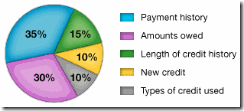The Real Story…
News and commentary about the real estate market and related topics.
Dave Parrish, ABR ®, CRSA, CSP, GRI, ePRO ®, REALTOR ®, RealtySouth
How Your Credit Score Is Determined
As we have previously discussed, your credit score (FICO Score) has far reaching impact on your life and your cost of living including possible impact on employment opportunities. With this in mind I thought it would be useful to discuss how your credit score is determined.
Your credit score is determined by a variety of factors, each of which makes up a portion of the score:
Note that the exact formula for calculating credit scores is constantly being evaluated and is subject to modification. The percentages indicated here are for comparative purposes only and are not meant to represent any precise scoring formula.
By far the most important factor in determining your credit score is your individual payment history. Previous loans and the ability to pay them are shown in this portion of the score. Both late payments and failure to pay at all affect this portion of the score. Those who have paid all of his or her loans on time will obtain the highest scores.
Secondly your score is determined by current debts, and the ratio of debt to the amount of available credit. Keeping all of your credit cards at or near their limits will hurt this portion of your score. The obvious assumption being: if you are already near your credit limit, you may have trouble paying back any future loans.
The remaining portion of your credit score is determined by three factors – length of credit history, recent credit applications, and the types of overall credit in the individual’s credit history. The length of the credit history is the most significant of these, as lenders are more suspicious of borrowers who have not established a pattern of borrowing and repaying loans. A history of repaid loans goes a long way towards strengthening this portion of the score. Recent credit applications, particularly a lot of them, may suggest that the individual is desperate to borrow more money and may have a financial problem. Similarly, the types of credit demonstrate spending patterns and reliability. A credit report containing all credit cards may be seen as more risky than one with a few credit cards, a repaid auto loan and an ongoing mortgage.
By seeing how your credit score is determined, you can take action to keep your scores healthy. A good score helps you obtain loans at better interest rates, and that is something that everyone can appreciate.
Your score considers both positive and negative information in your credit report. Late payments will lower your score, but establishing or re-establishing a good track record of making payments on time will raise your credit score.
While credit scores are only determined from the information in your credit report, lenders look at many things when making a credit decision including your income, how long you have worked at your present job and the kind of credit you are requesting.
In future articles we will look at what you can do to protect and improve your credit score.







